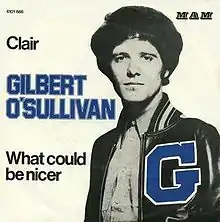Clair (song)
"Clair" is a song by Gilbert O'Sullivan, released in 1972 as the first single from his second album Back to Front. It was written by O'Sullivan and produced by Gordon Mills, and is one of O'Sullivan's biggest-selling singles.
| "Clair" | ||||
|---|---|---|---|---|
 | ||||
| Single by Gilbert O'Sullivan | ||||
| from the album Back to Front | ||||
| B-side | "What Could Be Nicer (Mum, The Kettle's Boiling)" (UK release), "Ooh-Wakka-Doo-Wakka-Day" (U.S. release) | |||
| Released | October 1972 | |||
| Genre | Pop, soft rock | |||
| Length | 3:03 | |||
| Label | MAM | |||
| Songwriter(s) | Gilbert O'Sullivan | |||
| Producer(s) | Gordon Mills | |||
| Gilbert O'Sullivan singles chronology | ||||
| ||||
Song details
The song is a love song from the point of view of a close family friend who babysits a young girl (actually the artist's manager's daughter), though for the first part of the song, the ambiguous words lead one to think that it is from one adult to another. The brief instrumental introduction is the sound of O'Sullivan whistling before he begins his vocal. The real Clair was the three-year-old daughter of O'Sullivan's producer-manager, Gordon Mills,[1] and his wife, the model Jo Waring. The little girl's giggling is heard at the end of this song. The "Uncle Ray" mentioned in the song is O'Sullivan himself, a reference to his real name of Raymond O'Sullivan. The instrumental break in the middle section is done half a step up from A to B-Flat, before going back to A.
Chart performance
"Clair" was the number one single on the UK Singles Chart for two weeks in November 1972,[2] and number one in Canada on the RPM 100 singles chart. In late December, it peaked at number two on the Billboard Hot 100 in the US, behind both "Me and Mrs. Jones" by Billy Paul and "You're So Vain" by Carly Simon.[3] "Clair" was also O'Sullivan's second and last number one hit on the U.S. Easy Listening chart, after "Alone Again (Naturally)".[4]
Cover versions
- An Italian rendition in 1973 by the crooner Johnny Dorelli.
- A version by Singers Unlimited was sampled by producer J Dilla for the Slum Village song "Players".
- Another cover (in English) was recorded in 2006 by French singer Laurent Voulzy on his album "La Septième Vague".
Chart performance
Weekly singles charts
|
Year-end charts
|
See also
- List of number-one singles of 1972 (Ireland)
- List of number-one singles from the 1970s (UK)
- List of number-one adult contemporary singles of 1972 (U.S.)
References
- Byrne, Andrea (18 April 2010). "When all is far from Clair, Gilbert goes to court". Sunday Independent. Retrieved 15 January 2018.
- Roberts, David (2006). British Hit Singles & Albums (19th ed.). London: Guinness World Records Limited. pp. 279–280. ISBN 1-904994-10-5.
- https://www.billboard.com/charts/hot-100/1972-12-30
- Whitburn, Joel (2002). Top Adult Contemporary: 1961-2001. Record Research. p. 187.
- Steffen Hung. "Forum - 1970 (ARIA Charts: Special Occasion Charts)". Australian-charts.com. Archived from the original on 2016-06-02. Retrieved 2016-10-06.
- RPM 100 Singles, January 13, 1973
- "Item: 7336 - Library and Archives Canada". Bac-lac.gc.ca. Retrieved 2016-10-06.
- "Toutes les Chansons N° 1 des Années 70" (in French). InfoDisc. Retrieved 22 December 2019.
- "The Irish Charts – Search Results – Clair". Irish Singles Chart. Retrieved July 11, 2017.
- "flavour of new zealand - search listener". Flavourofnz.co.nz. Retrieved 2016-10-06.
- "SA Charts 1965–March 1989". Retrieved 5 September 2018.
- "Gilbert O'Sullivan: Artist Chart History". Official Charts Company. Retrieved June 4, 2018.
- "Gilbert OSullivan Chart History (Hot 100)". Billboard. Retrieved June 4, 2018.
- "Gilbert OSullivan Chart History (Adult Contemporary)". Billboard. Retrieved June 4, 2018.
- "Top 100 1972 - UK Music Charts". Uk-charts.top-source.info. Retrieved 2016-10-06.
- David Kent's "Australian Chart Book 1970-1992" Archived March 5, 2016, at the Wayback Machine
- "Top 100 Hits of 1973/Top 100 Songs of 1973". Musicoutfitters.com. Retrieved 2016-10-06.
- "Top 100 Year End Charts: 1973". Cashbox Magazine. Retrieved 2016-06-25.
